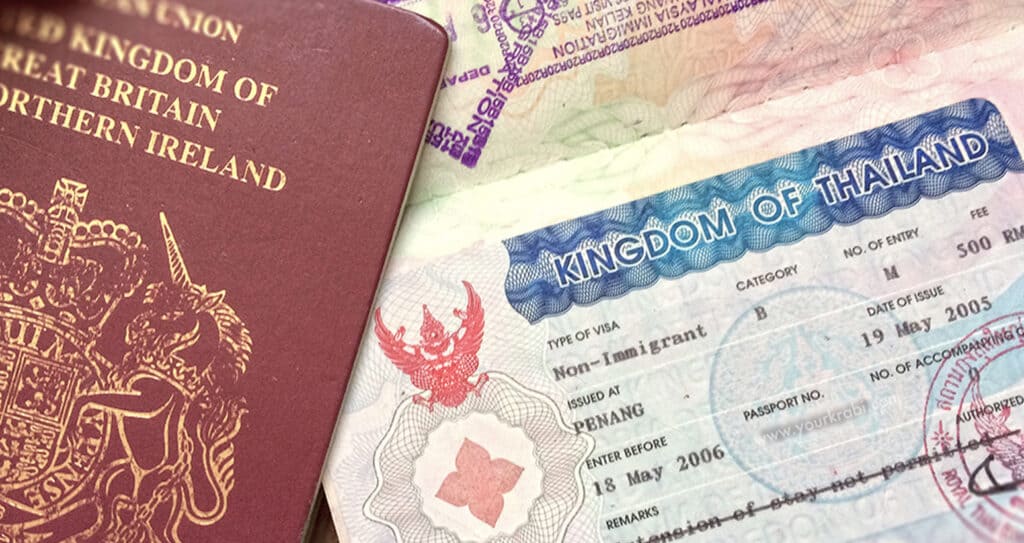Traveling to Thailand is an exciting and rewarding experience, but it’s important to consider safety and security when planning your trip. Whether you’re a first-time visitor or a seasoned traveler, being aware of the crime rates in Thailand, potential natural disasters, scams and frauds that can occur while abroad as well as other possible risks are essential for ensuring an enjoyable vacation.
In this blog post we’ll discuss Thailand safety and security so you can be prepared before their journey begins. We will cover topics such as crime rates in Thailand, travel insurance advice for tourists visiting the country, how to stay safe during your visit along with what do if faced with an emergency situation or given any warnings from Thai authorities.
Crime Rates in Thailand
Crime rates in Thailand are relatively low compared to other countries. However, there are still some areas where tourists should be aware of potential risks.
Common Crimes:
Petty theft and pickpocketing is the most common crime against tourists in Thailand. This type of crime usually occurs in crowded tourist spots such as markets, nightlife districts, airports, train stations and bus terminals. Tourists should always keep their belongings close to them and remain vigilant when out and about.
Other crimes that can occur include fraud or scams targeting tourists who may not be familiar with local customs or laws. Examples of these types of scams include fake taxi drivers overcharging for rides or tour operators offering fraudulent tours at inflated prices. It’s important to research any tour operators before booking a trip and only use licensed taxis from reputable companies when travelling around the country.
Areas To Be More Vigilant:
There have been reports of violent crimes occurring in certain parts of Bangkok including Khao San Road after dark so it’s best to avoid this area during late hours if possible. Other places known for high levels of criminal activity include Pattaya Beach which has a reputation for prostitution-related activities as well as drug trafficking throughout the city centre. Tourists should also take extra caution when visiting remote islands off the coast due to limited police presence in these areas.
That being said, Thailand is still remarkably safe place to be, compared to many other tourist destinations around the world.
Overall, crime rates in Thailand are relatively low compared to other countries. However, it is important to remain vigilant and aware of your surroundings while traveling in order to stay safe. Now let’s look at the risk of natural disasters in Thailand.
Natural Disasters
Natural disasters can occur in Thailand, just like any other country. Floods are one of the most common natural disasters to affect Thailand, as the country is prone to heavy monsoon rains during certain times of year. It’s important for tourists to be aware of this and take steps to stay safe if they find themselves in a flood-prone area. Tourists should avoid walking or driving through flooded areas and pay attention to local news reports about flooding conditions.
Earthquakes are another type of natural disaster that can occur in Thailand. While earthquakes aren’t as frequent as floods, they still pose a risk due to their unpredictable nature and potential for causing serious damage. If an earthquake occurs while you’re visiting Thailand, it’s important to remain calm and follow safety protocols such as dropping down onto your hands and knees or crouching under a sturdy table or desk until the shaking stops.
Tsunamis are also possible in some parts of Thailand but are much less likely than floods or earthquakes due to its location on the Indian Ocean side of Southeast Asia rather than on the Pacific Ocean side where tsunamis tend to originate from more often. Nevertheless, it’s important for tourists visiting coastal areas along the Gulf of Thailand or Andaman Sea coasts keep up with local news reports about tsunami warnings so they know what precautions need taken if necessary.
In general, it is always wise for visitors travelling anywhere in Southeast Asia – including Thailand – to have travel insurance coverage that includes protection against natural disasters such as floods, earthquakes and tsunamis. This is just in case something unexpected happens while they are away from home enjoying their holiday.
Natural disasters can occur in Thailand, so it is important to take precautions and plan ahead. Travel insurance is an essential part of any holiday planning, as it provides coverage for unexpected events like natural disasters.
Travel Insurance
Travel insurance is an important part of planning any holiday, especially when traveling to a foreign country. Before heading off on your Thailand adventure, it’s essential to make sure you have the right coverage for your trip.
Travel insurance can help protect you from unexpected costs due to medical emergencies, lost or stolen items, flight cancellations and delays, and more. It’s important to purchase travel insurance before leaving home so that if something does go wrong during your trip, you won’t be stuck with expensive bills or other financial losses.
When choosing a travel insurance policy for Thailand, there are several factors to consider:
- Coverage limits – Make sure the policy covers all activities planned during the trip as well as any potential medical expenses in case of illness or injury while abroad.
- Pre-existing conditions – Some policies may not cover pre-existing conditions such as asthma or diabetes; check with your insurer before purchasing a plan if this applies to you.
- Duration – Consider how long you will be away and choose a policy that covers the entire duration of your stay in Thailand.
- Destination – Check whether the policy includes coverage for destinations outside of Thailand (e.g., neighboring countries).
Finally, remember that most plans require travelers to pay out-of-pocket expenses first and then submit claims later for reimbursement; thus, it pays to keep receipts.
It’s important to be prepared for any potential risks while travelling. Having travel insurance can provide you with the peace of mind that if anything unexpected happens, you are covered. Now let’s look at scams and frauds to watch out for when visiting Thailand.
Scams and Frauds to Watch out For
Scams and frauds are unfortunately a reality when travelling, especially in countries like Thailand. It’s important to be aware of the most common scams so you can avoid them during your holiday.
Tuk-Tuk Scam
One of the most popular tourist attractions in Thailand is taking a ride on one of the country’s iconic tuk-tuks. Unfortunately, there have been reports of drivers overcharging tourists or taking them to shops where they are pressured into buying items at inflated prices. To avoid this scam, agree on a price before getting into the tuk-tuk and don’t let yourself be taken anywhere other than your intended destination without prior agreement with the driver.
Fake Police Officers
Be wary if someone claiming to be a police officer approaches you asking for money or identification documents as it may be an attempted scam. The real Thai police will never ask for money from tourists nor do they carry out random checks on people’s passports or visas – if you’re asked for either by someone who claims to be an officer, politely decline and walk away immediately.
ATM Fraud
ATM skimming is becoming increasingly common in Thailand so always check that no suspicious devices have been attached to ATMs before using them – look out for anything unusual around card slots such as extra wiring or components that shouldn’t be there as these could indicate tampering has occurred. Also remember not to use ATMs located inside bars, nightclubs or any other places where large amounts of cash transactions take place regularly as these are more likely targets for criminals looking to commit fraud against unsuspecting customers.
Unlicensed Tour Guides
It is essential that you only book tours through reputable companies who employ licensed tour guides; otherwise, you risk being scammed by unlicensed operators. These operators may try to charge excessive fees after initially promising low rates, lead tourists astray with false information about destinations, or simply provide substandard services compared to what was promised originally.
Be aware of common scams and frauds when travelling in Thailand, and always be cautious. Moving on to the next topic, let’s discuss how you can stay safe during your holiday in Thailand.
Staying Safe
When traveling to Thailand, it is important to be aware of your surroundings and take necessary precautions in order to stay safe. It is best to avoid dark alleys at night, as they can be dangerous. Also, try not to carry large amounts of cash or valuables with you when out and about; instead, use a credit card for purchases whenever possible.
Be sure to research the areas you plan on visiting ahead of time so that you are familiar with any potential risks or dangers associated with them. Additionally, keep an eye out for scams and frauds that may target tourists in Thailand. Be wary of people who offer too-good-to-be-true deals or services; if something seems suspicious, don’t engage with them further and walk away from the situation immediately.
Finally, it is important to know what steps should be taken in case of an emergency such as contacting local authorities or embassies if needed. This information can usually be found online through various government websites including those dedicated specifically towards travelers’ safety warnings for Thailand trips.
Remember to be aware of your surroundings and take the necessary precautions while travelling in Thailand. For further advice on what to do in an emergency, read the next section.
What To Do In An Emergency
If you find yourself in an emergency situation while traveling in Thailand, the first step is to contact local authorities. This can be done by calling the police or fire department at 191, or by dialing 1669 for an ambulance. If you are a foreign national and need assistance from your embassy, call them directly or visit their website for more information on how to reach out.
It is also important to know where your nearest hospital is located so that if medical attention is needed, it can be accessed quickly and easily. Additionally, make sure that you have all of your necessary documents with you (passport, visa etc.) as these may be required when seeking help from local authorities.
When contacting any authority in Thailand remember to remain calm and provide clear details about what has happened and where it occurred. Speak slowly and clearly when giving information such as address or location so that they can respond promptly and effectively. In some cases it may also be helpful to have someone who speaks Thai available if possible – this will ensure that communication between both parties runs smoothly without any misunderstandings due to language barriers.
In addition to knowing who/where to contact in case of an emergency situation, familiarize yourself with the laws of Thailand before travelling there – this will help prevent any legal issues arising during your stay which could complicate matters further should something happen unexpectedly while abroad. It’s also wise not travel alone late at night as doing so increases risk significantly; instead opt for taking public transportation whenever possible during hours of darkness for added safety measures against potential threats like theft or assault etc..
It is always important to keep a copy of important documents, such as passports and visas, on hand in case the originals are lost or stolen. This way, replacements can be obtained easily without having difficulty locating the original documentation again.
In any emergency, contact the local authorities and seek assistance as soon as possible. It is also important to stay up-to-date on travel warnings related to Thailand before your trip, so you can make informed decisions about where and when to go.
FAQs in Relation to Thailand Safety and Security
Is visiting Thailand safe?
Yes, visiting Thailand is generally safe. The country has a low crime rate and visitors are usually welcomed warmly by the locals. However, it’s important to take sensible precautions such as avoiding walking alone at night or carrying large amounts of cash with you. It’s also advisable to research any areas that may be off-limits due to political unrest before travelling there. By following these simple steps, tourists can enjoy their stay in Thailand without worry or fear for their safety.
What should I be careful of in Thailand?
When travelling in Thailand, it is important to be aware of the local laws and customs. It is illegal to disrespect the Thai royal family or display any signs of disrespect towards Buddhism. Additionally, dress modestly when visiting temples and other religious sites. Be mindful of scams such as overcharging for goods or services, especially when using tuk-tuks or taxis. Finally, take precautions against mosquito-borne illnesses by wearing insect repellent and covering exposed skin at dusk and dawn. By following these simple guidelines you can ensure a safe and enjoyable holiday in Thailand!
Is Thailand safe at night?
The country has a low crime rate and violent crimes are rare. However, it’s always best to take precautions such as avoiding dark alleys or unfamiliar areas after dark and being aware of your surroundings. It’s also recommended to avoid carrying large amounts of cash and valuables when out at night. With the right precautions, you can enjoy a safe evening in Thailand without any worries.
Conclusion
Overall, it is important to be aware of the potential risks and dangers when traveling to Thailand. By researching crime rates, natural disasters, scams and frauds, travel insurance options, staying safe tips and what to do in an emergency you can ensure that your trip is a safe one. Be sure to check for any travel warnings issued by the government before departing on your journey so that you can stay informed about Thailand safety and security while abroad.
Are you planning a holiday to Thailand? Don’t let safety and security worries stop you from enjoying all that this amazing country has to offer. With our comprehensive guide, we’ll help ensure your vacation is safe and secure while still allowing you the freedom to explore its many attractions. From providing information on local laws, customs and culture, tips for staying safe in different parts of the country, advice on finding accommodation with up-to-date safety features and more – trust us to make sure your holiday goes smoothly!




